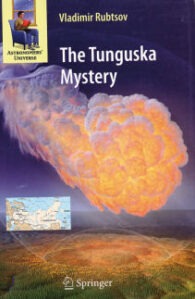By Vladimir Rubtsov and Edward Ashpol

It appears that I was naive to assume the Tunguska explosion of 1908 had been adequately explained. It was a meteorite or, more probably, a comet that exploded above a remote area of Siberia, wasn’t it?
Not necessarily!
This fascinating book, The Tunguska Mystery, shows that we still await a completely adequate scientific explanation and the jury is still out on what precisely the object was.
In 1908, something exploded over the taiga in central Siberia, destroying millions of trees and creating visual, magnetic, seismic and radioactive anomolies. Eyewitnesses confirm that something flew over their heads, and the damage to the forest and absence of an impact crater suggest that it (or they) exploded in the air rather than impacting the ground.
But what was it?
Rubtsov, an academic and popular science writer from the Ukraine, has written a marvellous detective story that, like best of this genre, makes you keep reading to find out who did it. Moreover, the author is sufficiently open-minded to consider all possibilities, even that of an exploding alien spaceship. (It is a fascinating insight that, had a science fiction writer not suggested this outlandish explanation, the idea that bolides can explode in the atmosphere may never have been considered.)
However, the story Rubtsov tells is not just about the mysterious explosion. It also is also a history of the chaotic contradictions of Soviet science. For example, Stalin thought he didn’t need biology, so party apparatchiks could dominate this area of research. However, he needed the best to build his nuclear arsenal, so timeserving Marxists were not suitable for work on quantum mechanics. For this reason, both scientific excellence and ideological purity were applied to the Tunguska problem.
In the end, Rubtsov comes out with an empirical description of the events that took place in 1908, but reserves judgement as to the cause. The problem is that, for every theory of what caused the event, there is empirical evidence that points another way. And too many theoreticians have tried to solve the problem a priori without considering all of the empirical evidence.
Nevertheless, he thinks we are close to a proper and timely explanation of what was a significant event for a planet existing in a violent universe. This is an excellent read, logically set out, but passionately expressed. Next time you go on holiday, don’t take that Agatha Christie, take this book …
The Tunguska Mystery, by Vladimir Rubtsov and Edward Ashpol, Springer+Business Media, LLC (2009), 318 pages (hardback), ISBN: 978-03-87765-75-7


